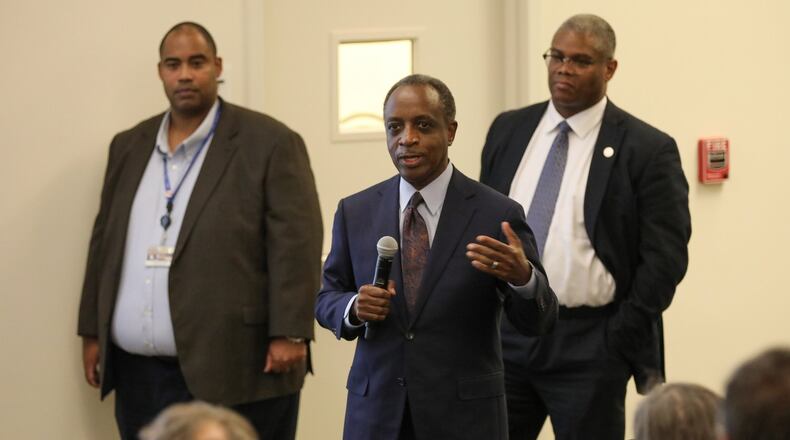Leigh Violante has lived near Green Street for more than 20 years.
For most of that time, she's tried unsuccessfully to get DeKalb County to address the pungent problem that has given the area a dubious distinction. In a county that's widely susceptible to sewer spills, Green Street is the second most prolific site for overflows — phenomena that routinely foul bike paths and front yards with human waste, feminine hygiene products and toilet paper.
“We would call and we would either get somebody who was inept or we would get somebody who just pushed it away, they would make excuses,” Violante said. “I was told in 2010 that [replacement] pipes had been ordered.”
That was clearly untrue.
But a decade later, Violante and her friends in Decatur’s Oakhurst neighborhood are now seeing concrete signs that things are headed in the right direction — at least in their small pocket of DeKalb, a county struggling to fulfill a long-standing legal agreement to fix its faulty sewage system.
DeKalb CEO Michael Thurmond and leaders from the county's Department of Watershed Management hosted a community meeting Tuesday night to discuss plans for the Green Street area. A $1.2 million project slated to begin in the next two weeks will involve replacing some 1,800 feet of sewer pipe.
Work is expected to last about six months.
During the meeting, Thurmond apologized for the county’s past negligence and incompetence while vowing to make things right, in Oakhurst and elsewhere.
Eventually.
“We’re going to go all across this county and get the job done,” Thurmond said. “But you can’t undo 40 years of neglect in three years.”
Thurmond took office in 2017, several years after DeKalb County entered a consent decree with state and federal environmental agencies to fix its aging water and sewer infrastructure. The mandate was to all but eliminate sewer spills, which can send harmful pathogens like E.coli into local waterways.
The county won’t meet the consent decree’s original deadline in June, and a new deal is being negotiated.
Thurmond has touted the sewer system as a top priority during his tenure. The county has thus far dedicated around $300 million toward the cause and total spill volumes decreased in 2018 and 2019. But heavy rains have helped drive a sloppy start to 2020, and provided a reminder of how much work is left to be done.
Shortly before midnight Tuesday — a few hours after the Green Street project kickoff — the county reported that 6.9 million gallons of sewage had spilled at a site near Meadow Creek Path in Lithonia. It was the same site as a 9.2-million-gallon spill that occurred last month, and was just one of at least 16 spills reported following last week's heavy rains.
A spokesman for Georgia’s Environmental Protection Division declined to comment on the new 6.9-million-gallon spill, but referred to statements from February in which the agency said it was “disappointed” in DeKalb’s lack of progress toward the original consent decree deadline.
Thurmond says finding the source of the problem on Meadow Creek Path is now a top priority and the county will have employees walk the lines and observe the area with helicopters and drones to figure things out.
“Fixing Green Street won’t fix the problem,” Thurmond said Tuesday. “It’s a countywide issue that’s gonna take at least, I believe, another seven years to address.”
Kharleen Williams may know that as well as anybody.
Williams lives on Keheley Drive, another spill-afflicted area a few miles south of Violante’s neighborhood.
Williams said she attended Tuesday night’s meeting to try and get help with her own issues, which won’t be directly addressed by the Green Street project.
She showed a reporter photos and videos of sewage pouring into her yard, backing up into her bathtubs and flooding her basement.
County officials told Williams that her area is one of several repeat spill sites that’s currently being “analyzed.” There are roughly 70,000 manholes in DeKalb County, about 20 of which are repeat offenders.
“The fact that … I have been able to get in contact, and they do have plans to remediate the situation, is comforting,” Williams said. “But I don’t have any immediate comfort.”
ANOTHER MAJOR SEWER SPILL
Shortly before midnight Tuesday, DeKalb County officials released information about a new 6.9-million-gallon sewer spill on Meadow Creek Path near Lithonia. The spill, triggered by last week’s heavy rain, was at the same site as last month’s 9.2-million-gallon spill, which was the largest reported in more than a decade. DeKalb CEO Michael Thurmond said that identifying the source of the stormwater intrusion that caused both recent spills is now a “top priority.”
About the Author
Keep Reading
The Latest
Featured






